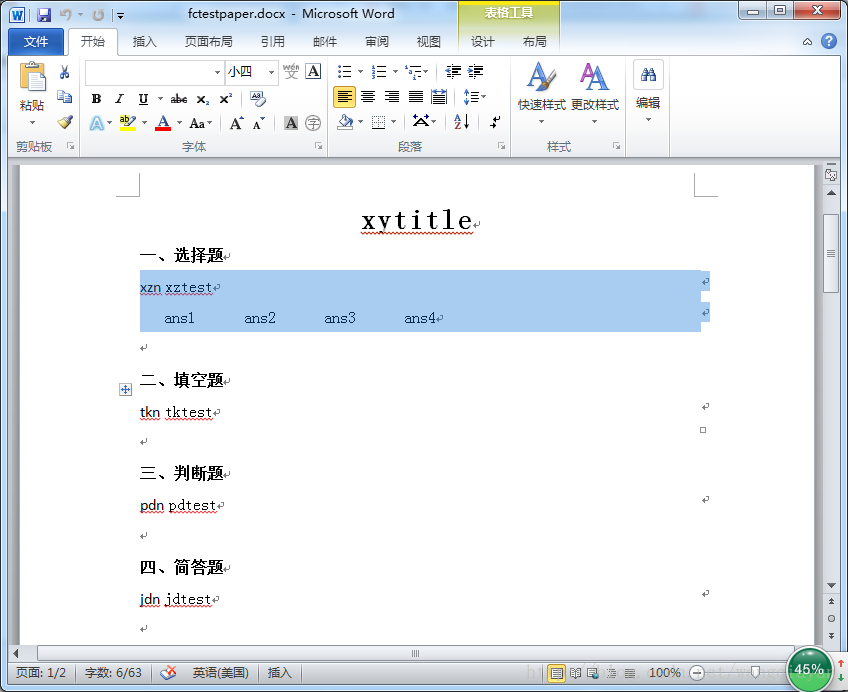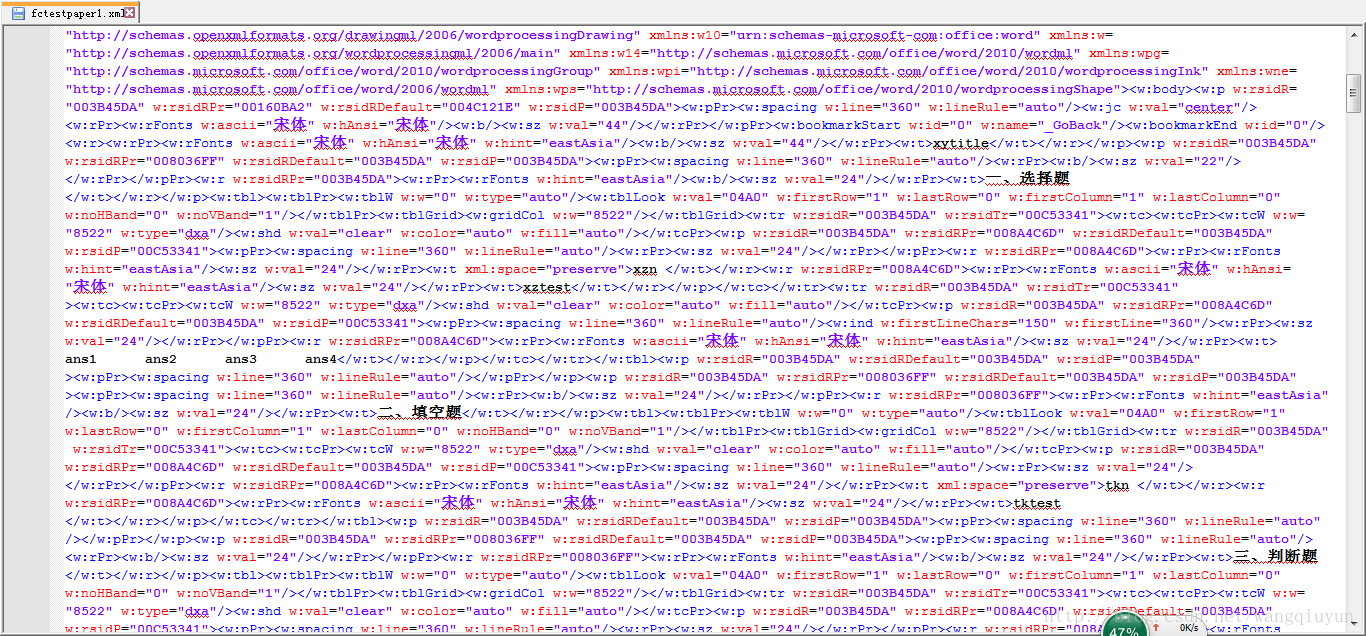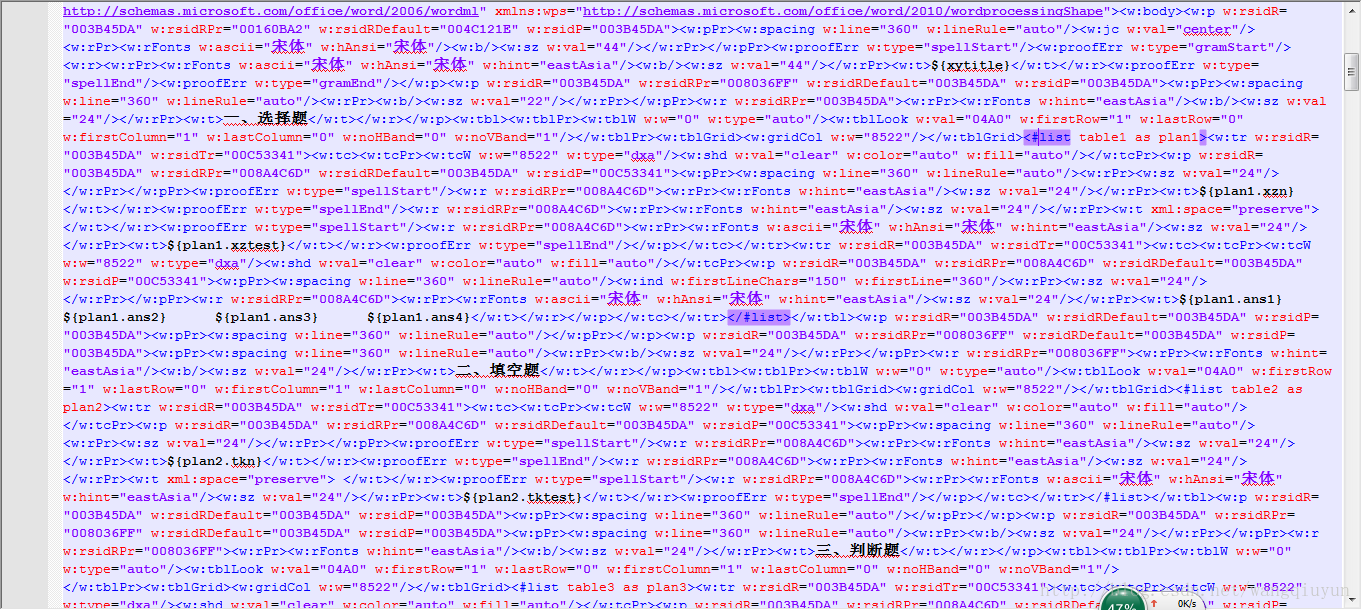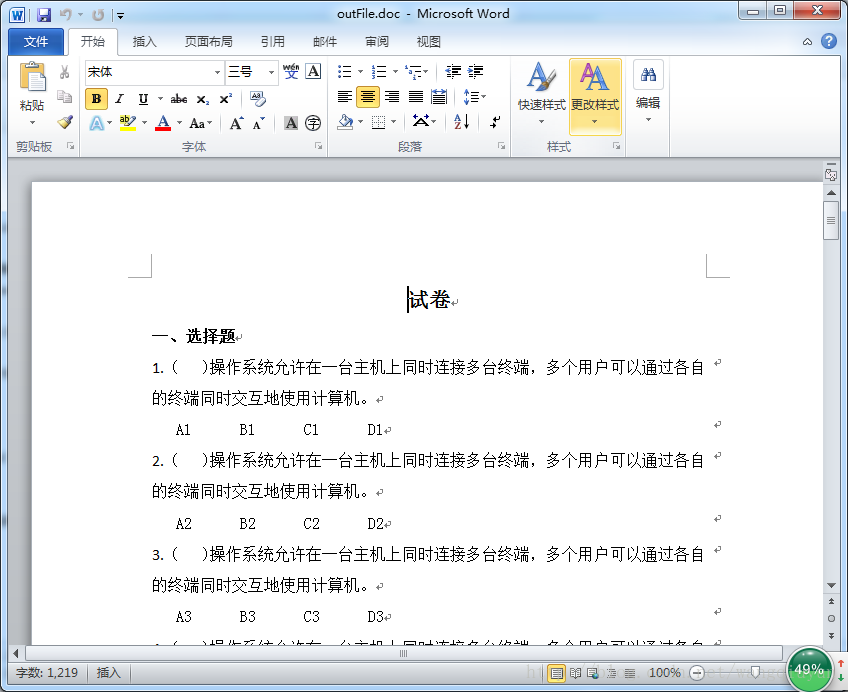Home >Java >javaTutorial >Practical example of using freemarker to export word using Java
Practical example of using freemarker to export word using Java
- 高洛峰Original
- 2017-01-05 13:18:211500browse
A recent project required exporting a word document. After struggling for a long time, I found that it was more convenient and trouble-free to use the freemarker template. Now I will summarize the key steps for your reference. Here is a simple example of test paper generation.
1. Template production
First use Word to make a template, as shown below:

(Note that there are tables above , I set the border to be invisible) and then save it as an XML file. Then use a tool to open the xml file. Some people use firstobject XML Editor and feel that it is not as good as notepad++. I use notepad++ here, mainly for highlighting and automatic pairing with elements. The effect As follows:

The black area above is basically the place we will replace later, such as replacing xytitle with ${xytitle}. Pay special attention to the table, such as below the multiple-choice question We can locate the table through

After saving, change the suffix to ftl, and the template is now complete.
2. Programming implementation
The freemarker-2.3.13.jar package is used here, the code is as follows:
package common;
import java.io.BufferedWriter;
import java.io.File;
import java.io.FileNotFoundException;
import java.io.FileOutputStream;
import java.io.IOException;
import java.io.OutputStreamWriter;
import java.io.UnsupportedEncodingException;
import java.io.Writer;
import java.util.Map;
import freemarker.template.Configuration;
import freemarker.template.Template;
import freemarker.template.TemplateException;
public class DocumentHandler {
private Configuration configuration = null;
public DocumentHandler() {
configuration = new Configuration();
configuration.setDefaultEncoding("utf-8");
}
public void createDoc(Map<String,Object> dataMap,String fileName) throws UnsupportedEncodingException {
//dataMap 要填入模本的数据文件
//设置模本装置方法和路径,FreeMarker支持多种模板装载方法。可以重servlet,classpath,数据库装载,
//这里我们的模板是放在template包下面
configuration.setClassForTemplateLoading(this.getClass(), "/template");
Template t=null;
try {
//test.ftl为要装载的模板
t = configuration.getTemplate("fctestpaper.ftl");
} catch (IOException e) {
e.printStackTrace();
}
//输出文档路径及名称
File outFile = new File(fileName);
Writer out = null;
FileOutputStream fos=null;
try {
fos = new FileOutputStream(outFile);
OutputStreamWriter oWriter = new OutputStreamWriter(fos,"UTF-8");
//这个地方对流的编码不可或缺,使用main()单独调用时,应该可以,但是如果是web请求导出时导出后word文档就会打不开,并且包XML文件错误。主要是编码格式不正确,无法解析。
//out = new BufferedWriter(new OutputStreamWriter(new FileOutputStream(outFile)));
out = new BufferedWriter(oWriter);
} catch (FileNotFoundException e1) {
e1.printStackTrace();
}
try {
t.process(dataMap, out);
out.close();
fos.close();
} catch (TemplateException e) {
e.printStackTrace();
} catch (IOException e) {
e.printStackTrace();
}
//System.out.println("---------------------------");
}
}
Then just prepare the data call. The code is as follows:
package com.havenliu.document;
import java.io.UnsupportedEncodingException;
import java.util.ArrayList;
import java.util.HashMap;
import java.util.List;
import java.util.Map;
public class Main {
/**
* @param args
* @throws UnsupportedEncodingException
*/
public static void main(String[] args) throws UnsupportedEncodingException {;
Map<String, Object> dataMap = new HashMap<String, Object>();
dataMap.put("xytitle", "试卷");
int index = 1;
// 选择题
List<Map<String, Object>> list1 = new ArrayList<Map<String, Object>>();//题目
List<Map<String, Object>> list11 = new ArrayList<Map<String, Object>>();//答案
index = 1;
for (int i = 0; i < 5; i++) {
Map<String, Object> map = new HashMap<String, Object>();
map.put("xzn", index + ".");
map.put("xztest",
"( )操作系统允许在一台主机上同时连接多台终端,多个用户可以通过各自的终端同时交互地使用计算机。");
map.put("ans1", "A" + index);
map.put("ans2", "B" + index);
map.put("ans3", "C" + index);
map.put("ans4", "D" + index);
list1.add(map);
Map<String, Object> map1 = new HashMap<String, Object>();
map1.put("fuck", index + ".");
map1.put("abc", "A" + index);
list11.add(map1);
index++;
}
dataMap.put("table1", list1);
dataMap.put("table11", list11);
// 填空题
List<Map<String, Object>> list2 = new ArrayList<Map<String, Object>>();
List<Map<String, Object>> list12 = new ArrayList<Map<String, Object>>();
index = 1;
for (int i = 0; i < 5; i++) {
Map<String, Object> map = new HashMap<String, Object>();
map.put("tkn", index + ".");
map.put("tktest",
"操作系统是计算机系统中的一个___系统软件_______,它管理和控制计算机系统中的___资源_________.");
list2.add(map);
Map<String, Object> map1 = new HashMap<String, Object>();
map1.put("fill", index + ".");
map1.put("def", "中级调度" + index);
list12.add(map1);
index++;
}
dataMap.put("table2", list2);
dataMap.put("table12", list12);
// 判断题
List<Map<String, Object>> list3 = new ArrayList<Map<String, Object>>();
List<Map<String, Object>> list13 = new ArrayList<Map<String, Object>>();
index = 1;
for (int i = 0; i < 5; i++) {
Map<String, Object> map = new HashMap<String, Object>();
map.put("pdn", index + ".");
map.put("pdtest",
"复合型防火墙防火墙是内部网与外部网的隔离点,起着监视和隔绝应用层通信流的作用,同时也常结合过滤器的功能。");
list3.add(map);
Map<String, Object> map1 = new HashMap<String, Object>();
map1.put("judge", index + ".");
map1.put("hij", "对" + index);
list13.add(map1);
index++;
}
dataMap.put("table3", list3);
dataMap.put("table13", list13);
// 简答题
List<Map<String, Object>> list4 = new ArrayList<Map<String, Object>>();
List<Map<String, Object>> list14 = new ArrayList<Map<String, Object>>();
index = 1;
for (int i = 0; i < 5; i++) {
Map<String, Object> map = new HashMap<String, Object>();
map.put("jdn", index + ".");
map.put("jdtest", "说明作业调度,中级调度和进程调度的区别,并分析下述问题应由哪一级调度程序负责。");
list4.add(map);
Map<String, Object> map1 = new HashMap<String, Object>();
map1.put("answer", index + ".");
map1.put("xyz", "说明作业调度,中级调度和进程调度的区别,并分析下述问题应由哪一级调度程序负责。");
list14.add(map1);
index++;
}
dataMap.put("table4", list4);
dataMap.put("table14", list14);
MDoc mdoc = new MDoc();
mdoc.createDoc(dataMap, "E:/outFile.doc");
}
}
Note that the key in the map above must correspond to the key in the template, otherwise an error will be reported. The effect is as follows:

The above is the entire content of this article. I hope it will be helpful to everyone's learning, and I also hope that everyone will support the PHP Chinese website.
For more practical examples of Java using freemarker to export word, please pay attention to the PHP Chinese website!

